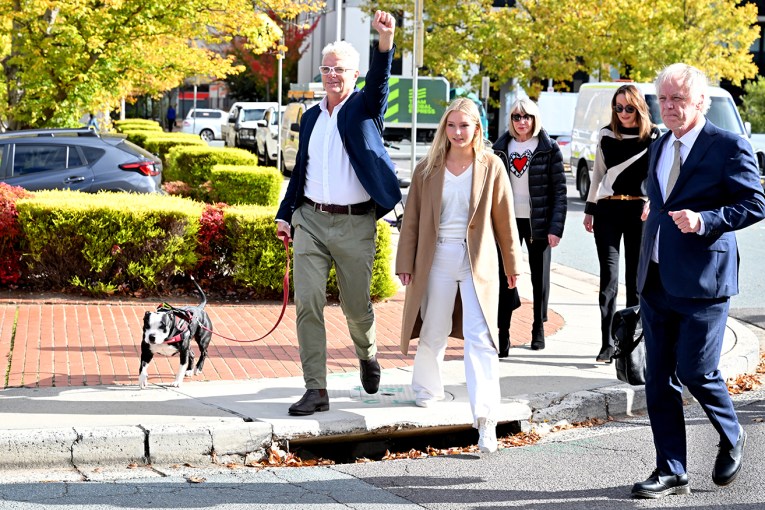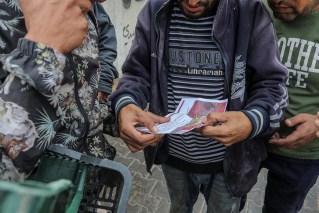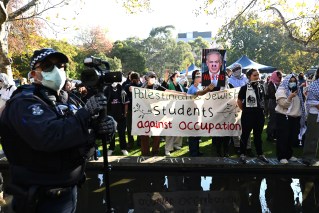Australian Human Rights Commission unveils proposed federal act

Rosalind Croucher says a human rights act is Australia's missing piece of government accountability. Photo: AAP
A key proposal for Australia’s first federal human rights act would see religious freedom, expression, privacy and the environment included among 28 protections.
The Australian Human Rights Commission on Tuesday night launched its proposed model to replace the nation’s patchwork of rights, international obligations and recourse limitations with one coherent document.
The culmination of a four-year review of the current framework and extensive consultation with civil liberty groups, legal experts and rights advocates, the proposed act would reflect and codify fundamental common law rights.
Presumption of innocence in criminal trials and freedom of movement are examples of such rights that are “fragile” due to Parliament’s power to override them with new laws, the commission argues.
“A Human Rights Act is the central missing piece of government accountability in Australia,” commission president Rosalind Croucher said.
“It will increase transparency and trust in governments by requiring them to fully consider human rights in their decisions, policies and practice.”
Although the ACT, Victoria and Queensland have filled the gap with their own acts, Australia stands alone among liberal democracies by lacking a federal human rights act.
Having one would mean freedom of movement would explicitly prevent anyone being arbitrarily deprived of the right to enter their own country and grant all people lawfully in Australia the right to move freely within the country, as well as to leave.
Freedom of thought, conscience, religion and belief would be protected, as would the freedoms of association and expression.
Several rights address the criminal justice system, including the right to a fair trial, protection from being tried under retrospective criminal laws and the right to compensation for wrongful conviction.
A right to an environment that does not produce adverse health consequences would also be included.
Unlike the United States, the commission’s model would retain and emphasise the supremacy of the parliament and would not require constitutional change.
Ms Croucher said the current levers – the constitution’s protection of some rights, parliamentary scrutiny of laws encroaching on rights and the principle of legality – were “insufficient” and did not provide the human rights protection all people in Australia are entitled to.
“The beauty of a Human Rights Act and other measures that frontload rights-mindedness is that they are expressed in the positive – and they are embedded in decision making and ahead of any dispute,” Ms Croucher said.
“A Human Rights Act names rights; it provides an obligation to consider them and a process by which to do it – together supporting a cultural shift towards rights-mindedness, becoming part of the national psyche, not just an afterthought.”
The commission’s position paper on its model points specifically to the harsher restrictions and heavy military and police presence in western Sydney during the COVID-19 pandemic, which led to a breakdown in trust and residents feeling they were being “scapegoated”.
A human rights-based approach would have required the government and police to transparently justify why stricter measures were being used in certain areas and forced them to recognise cultural differences, the commission argues.
When rights protected under the act were impeded, affected persons could follow the process in place for discrimination complaints: try for a solution through conciliation or administrative appeal and then refer the matter to the Federal Court.
The position paper is available on the commission’s website. A final report will be tabled in Parliament later this year.
Broad freedoms
- Recognition and equality before the law; and freedom from discrimination
- Freedom of expression, including to impart ideas of all kinds through speech, writing, art or another medium.
- Right to life, and the right not to be arbitrarily deprived of life
- Protection from torture and cruel, inhumane or degrading treatment
- Right for people of particular cultural, religious, racial or linguistic backgrounds to enjoy their culture
- Freedom of thought, conscience, religion and belief
- Right of peaceful assembly and freedom of association
- Protections to participate in public life
- Right to liberty and security of person and freedom from arbitrary arrest or detention.
Youth and families
- Right to education
- Rights of every child to necessary protections and right to a name
- Protection of families.
Justice system
- Right to humane treatment when deprived of liberty
- Rights protecting children in the criminal process
- Right to a fair hearing
- Right to innocence until proven guilty and other rights in criminal proceedings
- Right to compensation for wrongful conviction
- Right not to be tried or punished more than once
- Freedom from being convicted under retrospective criminal laws
- Health and living circumstances
- Rights to health services without discrimination, and to emergency treatment that is immediately necessary
- Right to an adequate standard of living, including right not to be arbitrarily evicted
- Right to a healthy environment
- Freedom of movement, including to choose where to live
- Right to not have privacy, family, home or correspondence unlawfully or arbitrarily interfered with, or reputation unlawfully attacked.
Work
- Right to work and other work-related rights (trade union, just and favourable conditions)
- Right to social security
- Freedom from forced work, not including court-ordered community service or where the life of the community is under threat.
-AAP








